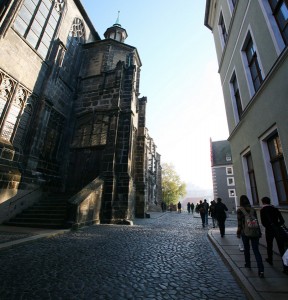
Every autumn term, after the first three palpitating weeks, the ECLA community departs on an annual excursion.
And since beginnings are about exploration and searching, every year the autumn trip has a different destination, revealing the sometimes hidden marvels of Germany, bit by bit, town by town. On October 21st, students, along with the members of the faculty and administration, departed on a journey to Görlitz, the easternmost town in Germany.
I won’t hide the slight uneasiness in my heart that I shared with my colleagues as we were leaving, since always before going on an excursion one thinks of the possible ‘rupture’ in the rhythm of academic life.
But I will also say, though with anticipation, that with every excursion I feel more and more convinced that not only is it possible to harmonize the two activities of work and pleasure, but that the ‘escapade’ may become a catalyst for academic work.
Once we arrived in Görlitz, some people chose the way of the vita activa, hastily leaving for a bike tour of the town, while others went for an informal walk with Dirk Deichfuss, our German professor and the main organizer of the trip. Last but not least, some hid in one of the quiet cafes to read, or explored the local bookshops (I was surprised to find Romanian fairy tales translated into German!).
According to the information booklets we received before the excursion Görlitz is, “…for many the most beautiful town in Germany.” Were I to speak of the beauty of it, I would perhaps point at the rich and well-preserved architecture—the gothic Peterskirche, or the renaissance Schönhof—or, of its natural beauties, the river and the mountain included.
But, for me, the beauty of Görlitz proved to be something else: the German Görlitz is also the Polish city of Zgorzelec (let me advocate the one-ness of the town, in spite of the political border). Only a pedestrian bridge separates the two towns, and there is no passport control. And while for some it’s a bridge that is reminiscent of the tumultuous era of European border-defining, crossing it a couple of times gave me an incredible feeling of freedom and unity—the mortal blow to the whole concept of “border” instilled in me since childhood.
The next day had only encouraged me to think about the whole excursion from precisely this perspective. It was the most active day and during the course of it we went from Germany to the Czech Republic and from the Czech Republic back to Germany; from Germany to Poland, and then back. In the Czech Republic we visited Frýdlant Castle, built in both Gothic and Renaissance styles.
We stopped in Germany in a beautiful town of Oybin, where many of us took the challenge to climb the picturesque rock to the ruins of the Bohemian Royal Castle and Oybin Monastery. Back in Zgorzelec we had a dinner of Polish cuisine at a reconstructed timber frame farmhouse. On our way back to Berlin, we stopped in one last town, Bautzen, which is the symbolic capital of the Sorb minority.
Looking back to the whole experience of the trip, I began to wonder what my dominant feeling was. I celebrated the feeling of freedom and of a hypothetical “one-ness” that the bridge and the uninterrupted landscape gave me. But, then, I was overwhelmed by the pleasure that the incredible heterogeneity of these days, places and people offered: like that magical moment in Görlitz, when a stranger almost congratulated us, a cheerful group of some fifteen ECLA students, for being so diverse and interesting.
Aurelia Cojocaru (2nd year BA, Moldova)
